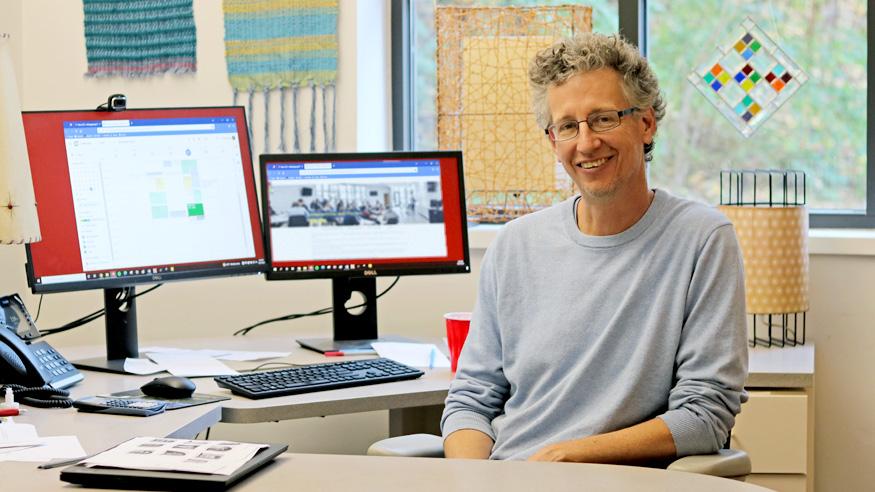
Dr. Mike Augspurger believes “a good engineer needs to be well-rounded to be successful."
Engineering majors build connections across campus
Majoring in engineering feels different at a liberal arts college. At Augustana next semester, Dr. Jackie Opfer is teaching a course on the relationship between engineering and empire-building throughout history.

Dr. Jackie Opfer, assistant professor of physics, engineering and astronomy
It’s intentional. The college’s new Engineering (Bachelor of Science) program is embracing the “interdisciplinary nature of engineering,” said Dr. Mike Augspurger, assistant professor of engineering.
This year he’s teaching a modeling and simulation course, guiding engineering students through that process from conceptualization through interpretation, using computer applications.
“We explore the effects of different variables on the behavior of a physical system, whether the system is the population of rabbits in an ecosystem or the trajectory of a person bungee-jumping off a bridge,” he explained.
Other courses Dr. Augspurger is developing include mechanics of deformable bodies — studies of how strain results from stress on solid parts — and engineering and experimentation, where sophomores will compare and assess their designs on the way to completing their projects.
“In the liberal arts context [at Augustana], we can offer students training in how to write, how to communicate, how to work with others, and how to interpret the results of their technical work,” he said.
New to Augustana this fall, Dr. Jackie Opfer is an assistant professor of physics, engineering and astronomy. Throughout an academic career devoted solely to engineering, she has had many ideas on how to connect engineering to other disciplines. She feels Augustana is the right place for her.
“I’m a huge fan of all the cross-departmental collaborations and conversations here.”
“Getting a say in how a program is structured seemed like an ideal opportunity for me,” she said. “I’m a huge fan of all the cross-departmental collaborations and conversations here.”
Always looking for ways to use available resources, Dr. Opfer and her students will be exploring the campus Slough in her upcoming environmental engineering course. She’s also currently searching for a much larger and deeper lake in the Quad-Cities area for her research on how algae multiplies rapidly, sometimes forming harmful “blooms” in bodies of water depending on light, temperature and turbulence.
Mechanically minded students looking for an experience to help them stand out should reach out to Dr. Opfer. She's looking for students to build a monitoring station at the lake, where they will take and analyze water samples in the summer months.
Looking ahead to next fall, Dr. Opfer and Dr. Augspurger are developing a fluid dynamics class, which studies problems that impact people as well as the natural world.
Maintaining public and habitat health, and sustainable energy sources — these projects matter, according to the professors. Dr. Augspurger points out that “larger social problems often can only be solved with the help of technical know-how.”
Dr. Opfer credits the focus on STEM in recent decades with attracting a broader diversity of people to the sciences. “We need all types of people with all types of passions to tackle the big, sticky problems we collectively face,” she said.
But above all, “a good engineer needs to be well-rounded to be successful,” Dr. Augspurger noted.
